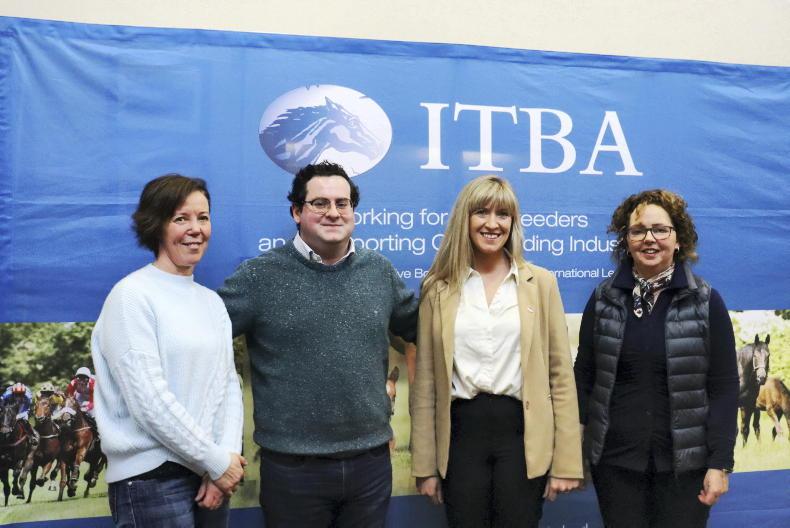I have always been a logical thinker,” admits Lorraine Fradl. “During my teenage years I spent every spare moment in Kilronan Equestrian Centre working with Johnny O’Connell’s team of show jumpers and helping in the riding school. It was great to go on and combine this trait with my passion for horses and study Equine Science in UCD.”
Stud farms
A keen personal interest in human nutrition and a good grasp of equine nutrition from college was the foundation for Lorraine to move into her current career as an equine nutritionist.
“After getting lots of practical hands-on experience, working both at home and abroad on Thoroughbred stud farms, I decided to apply for an opening with Connolly’s Red Mills as an Equine Nutritional Advisor for export markets.”
“Every day is different! We offer a free nutrition support service to our customers, so I usually spend a couple of days a week on the road calling to yards.
When I am in the office I am involved in new product developments, creating educational content such as articles for customers and colleagues, packaging and labelling compliance, and answering general nutrition related queries from customers.”
Bedrock
Despite there being a plethora of scientific proof out there in terms of knowing why nutrition is the bedrock for equine health, some people still seem to struggle to get the balance right.
Lorraine agrees, believing that there is value in reaching out and getting help from a nutritionist if the service is available to you. “The price of feeding a horse has risen in recent times and by analysing your horses’ diets you might find you are adding in something you don’t need, or falling short on a nutrient that will be required for your horse to thrive.”
Quality
Lorraine explains that it’s important to get the basics correct. Invest in good quality, clean hay and a good quality feed. “Moulds and mycotoxins are a risk to in-foal mares and may also affect the fertility of mares needing to be rebred. If in doubt about the quality, don’t feed it.
“For mares, 60% of foetal growth occurs in the final three months of the pregnancy. It is important to ensure your mare is getting high quality protein sources to support growth and development of the foal, and to ensure she is receiving key minerals such as copper and zinc, which will transfer to the foal via the placenta for use in early life.
“These minerals are deficient in mares’ milk so getting the mares nutritional balance right during pregnancy will have a direct impact on the foals nutritional status after birth.”

Lorraine’s husband Brian Duffy has a restricted trainer’s licence. \ Healy Racing
Life stages
Lorraine is a firm believer in the more knowledge out there the better. If a breeder understands the requirements of their stock at different life stages and understands the properties of different types of feed ingredients, they will be able to make better informed decisions about what feed will be appropriate to use in each scenario they face.
Talks like the recent ITBA one give nutritionists like Lorraine the opportunity to highlight the problems breeders may face such as bone development and ways of minimising the risks.
Lorraine’s husband Brian Duffy has a restricted trainer’s licence. “We have a couple of horses in training and keep a couple of broodmares also. We’ve been fortunate to have great success with small numbers.
Brian trained the Galway Mile winner Magic Chegaga last year and in previous years bred a Group 1 winner, Jet Setting. I can’t take any of the credit for the hard work that goes into our own horses, but I will claim that the feed was a positive influence on their achievements!”
Minefield
Supplementation can be a minefield for breeders with so many products on the market and Lorraine is pragmatic in her approach. “If you chose to use supplements, use a reputable brand that you know are using quality raw materials and are testing their finished products.
"Educate yourself on what levels of the active ingredients are required to achieve the positive effects that you are supplementing for.
“Copper supplements for example, are popular in breeding stock and youngstock but there are multiple sources of copper available for use with varied levels of bioavailability, so the cheapest is not always the best and the highest levels are not always superior.
If in doubt reach out to a nutritionist for advice.”
I have always been a logical thinker,” admits Lorraine Fradl. “During my teenage years I spent every spare moment in Kilronan Equestrian Centre working with Johnny O’Connell’s team of show jumpers and helping in the riding school. It was great to go on and combine this trait with my passion for horses and study Equine Science in UCD.”
Stud farms
A keen personal interest in human nutrition and a good grasp of equine nutrition from college was the foundation for Lorraine to move into her current career as an equine nutritionist.
“After getting lots of practical hands-on experience, working both at home and abroad on Thoroughbred stud farms, I decided to apply for an opening with Connolly’s Red Mills as an Equine Nutritional Advisor for export markets.”
“Every day is different! We offer a free nutrition support service to our customers, so I usually spend a couple of days a week on the road calling to yards.
When I am in the office I am involved in new product developments, creating educational content such as articles for customers and colleagues, packaging and labelling compliance, and answering general nutrition related queries from customers.”
Bedrock
Despite there being a plethora of scientific proof out there in terms of knowing why nutrition is the bedrock for equine health, some people still seem to struggle to get the balance right.
Lorraine agrees, believing that there is value in reaching out and getting help from a nutritionist if the service is available to you. “The price of feeding a horse has risen in recent times and by analysing your horses’ diets you might find you are adding in something you don’t need, or falling short on a nutrient that will be required for your horse to thrive.”
Quality
Lorraine explains that it’s important to get the basics correct. Invest in good quality, clean hay and a good quality feed. “Moulds and mycotoxins are a risk to in-foal mares and may also affect the fertility of mares needing to be rebred. If in doubt about the quality, don’t feed it.
“For mares, 60% of foetal growth occurs in the final three months of the pregnancy. It is important to ensure your mare is getting high quality protein sources to support growth and development of the foal, and to ensure she is receiving key minerals such as copper and zinc, which will transfer to the foal via the placenta for use in early life.
“These minerals are deficient in mares’ milk so getting the mares nutritional balance right during pregnancy will have a direct impact on the foals nutritional status after birth.”

Lorraine’s husband Brian Duffy has a restricted trainer’s licence. \ Healy Racing
Life stages
Lorraine is a firm believer in the more knowledge out there the better. If a breeder understands the requirements of their stock at different life stages and understands the properties of different types of feed ingredients, they will be able to make better informed decisions about what feed will be appropriate to use in each scenario they face.
Talks like the recent ITBA one give nutritionists like Lorraine the opportunity to highlight the problems breeders may face such as bone development and ways of minimising the risks.
Lorraine’s husband Brian Duffy has a restricted trainer’s licence. “We have a couple of horses in training and keep a couple of broodmares also. We’ve been fortunate to have great success with small numbers.
Brian trained the Galway Mile winner Magic Chegaga last year and in previous years bred a Group 1 winner, Jet Setting. I can’t take any of the credit for the hard work that goes into our own horses, but I will claim that the feed was a positive influence on their achievements!”
Minefield
Supplementation can be a minefield for breeders with so many products on the market and Lorraine is pragmatic in her approach. “If you chose to use supplements, use a reputable brand that you know are using quality raw materials and are testing their finished products.
"Educate yourself on what levels of the active ingredients are required to achieve the positive effects that you are supplementing for.
“Copper supplements for example, are popular in breeding stock and youngstock but there are multiple sources of copper available for use with varied levels of bioavailability, so the cheapest is not always the best and the highest levels are not always superior.
If in doubt reach out to a nutritionist for advice.”







 This is a subscriber-only article
This is a subscriber-only article












SHARING OPTIONS: